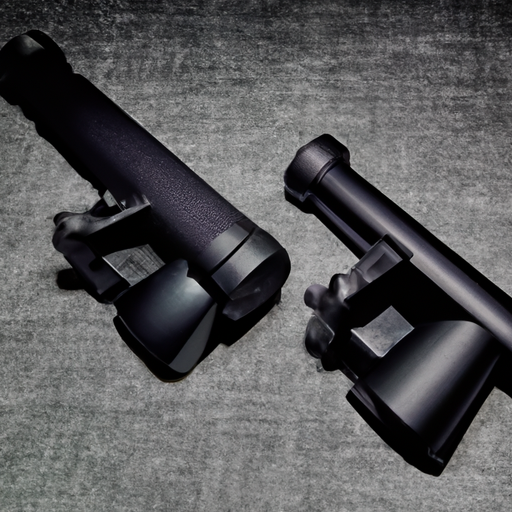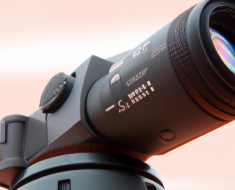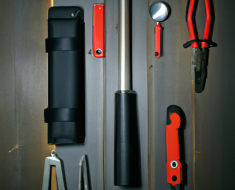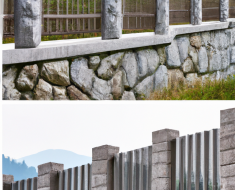“Maximize accuracy and minimize kick with our top-rated pistol compensators.”
Top 10 Pistol Compensators for Reduced Recoil
If you’re a gun enthusiast or competitive shooter looking to reduce recoil and improve accuracy, investing in a pistol compensator is a great option. A compensator is a device that attaches to the barrel of your pistol and helps redirect gases to reduce muzzle rise and felt recoil. This can lead to faster follow-up shots and better overall control of your firearm.
There are many different pistol compensators on the market, each with its own unique design and features. To help you navigate the options, we’ve compiled a list of the top 10 pistol compensators for reduced recoil. Whether you’re a seasoned shooter or just starting out, there’s sure to be a compensator on this list that meets your needs.
First up on our list is the Agency Arms 417 Compensator. This compensator is designed specifically for Glock pistols and features a sleek, low-profile design that won’t add unnecessary bulk to your firearm. The Agency Arms 417 Compensator is known for its excellent recoil reduction and minimal impact on sight picture, making it a popular choice among competitive shooters.
Next, we have the Strike Industries G4 Slide Compensator. This compensator is compatible with most Glock models and is designed to improve both recoil control and muzzle flip. The Strike Industries G4 Slide Compensator is easy to install and offers a significant reduction in felt recoil, making it a great choice for shooters of all skill levels.
If you’re looking for a high-quality compensator at an affordable price, the Tyrant Designs T-Comp might be the perfect option for you. This compensator is compatible with most 9mm pistols and offers excellent recoil reduction without breaking the bank. The Tyrant Designs T-Comp features a unique three-chamber design that helps redirect gases efficiently, resulting in improved control and accuracy.
For those who prefer customization options, the Lone Wolf Distributors AlphaWolf Compensator is a great choice. This compensator is available in multiple finishes and is compatible with most Glock models. The AlphaWolf Compensator features a simple yet effective design that offers excellent recoil reduction and improved shot-to-shot consistency.
Rounding out our list is the ZEV Technologies Pro Compensator. This compensator is designed for use with Glock pistols and offers superior recoil reduction and muzzle control. The ZEV Technologies Pro Compensator features a precision-machined design that ensures optimal gas redirection, resulting in smoother shooting and improved accuracy.
In conclusion, investing in a pistol compensator can greatly improve your shooting experience by reducing recoil and improving control. With so many options available on the market, it’s important to choose a compensator that meets your specific needs and preferences. Whether you’re looking for a sleek design, affordable price point, or superior performance, there’s sure to be a compensator on our list that fits the bill. So why wait? Upgrade your pistol today and experience reduced recoil like never before!
How to Choose the Best Pistol Compensator for Your Firearm
When it comes to shooting a pistol, one of the biggest factors that can affect your accuracy and control is recoil. Recoil is the backward movement of a gun when it is fired, and it can cause the gun to jump in your hand, making it harder to stay on target. This is where pistol compensators come in. A compensator is a device that attaches to the end of your pistol barrel and helps reduce recoil by redirecting gases that are expelled when the gun is fired.
There are many different types of compensators available on the market, so choosing the best one for your firearm can be a bit overwhelming. However, there are a few key factors to consider when selecting a compensator that will help you reduce recoil and improve your shooting accuracy.
One of the first things to consider when choosing a compensator is the material it is made from. Compensators are typically made from either aluminum or steel. Aluminum compensators are lightweight and great for reducing recoil, but they may not be as durable as steel compensators. Steel compensators, on the other hand, are heavier but more robust and can withstand more wear and tear.
Another important factor to consider is the design of the compensator. There are several different designs available, including traditional barrel bushing compensators, ported compensators, and hybrid designs. Traditional barrel bushing compensators attach directly to the end of your barrel and redirect gases upward to help reduce recoil. Ported compensators have holes or ports that allow gases to escape from the sides of the compensator, further reducing recoil. Hybrid designs combine elements of both traditional and ported compensators for maximum recoil reduction.
It’s also essential to consider compatibility when choosing a compensator for your pistol. Not all compensators are compatible with every type of firearm, so make sure you do your research before making a purchase. Some manufacturers offer specific compensators designed for certain models of pistols, so be sure to check if there is a compatible option available for your firearm.
When looking for the best pistol compensator for reduced recoil, it’s essential to consider customer reviews and feedback. Reading reviews from other shooters who have used the compensator you are considering can give you valuable insight into its performance and durability. Look for reviews that mention reduced recoil, improved accuracy, and overall satisfaction with the product.
In conclusion, choosing the best pistol compensator for reduced recoil involves considering factors such as material, design, compatibility, and customer feedback. By taking these factors into account, you can select a compensator that will help you improve your shooting accuracy and control by reducing recoil. Whether you are a competitive shooter or just looking to enhance your skills at the range, investing in a quality pistol compensator can make a significant difference in your shooting experience.
Benefits of Using a Pistol Compensator for Reduced Recoil

If you’re looking to improve your shooting accuracy and reduce recoil, a pistol compensator may be just what you need. These devices attach to the end of your pistol barrel and redirect gases to help counteract the upward force of recoil. Not only can a compensator make shooting more comfortable, but it can also enhance your overall shooting performance.
One of the key benefits of using a pistol compensator is reduced recoil. When you fire a pistol, the gases produced by the ignited gunpowder push the bullet out of the barrel. This action also creates an equal and opposite reaction, causing the gun to kick back in your hand. A compensator helps to mitigate this recoil by redirecting some of those gases upward, which counteracts the upward force on the muzzle of the gun. This results in less muzzle rise and a smoother shooting experience.
Reduced recoil isn’t just about comfort—it also has practical benefits for shooters. By minimizing muzzle rise, a compensator allows you to stay on target more easily between shots. This can lead to faster follow-up shots and improved accuracy overall. Whether you’re competing in a shooting match or defending yourself in a high-pressure situation, every advantage counts.
Another advantage of using a pistol compensator is improved control over your firearm. With less muzzle rise and reduced recoil, you can maintain better control over your gun during rapid fire or when shooting multiple rounds in quick succession. This increased control can translate into better shot placement and more consistent shooting performance.
In addition to reducing recoil and improving control, some compensators also offer other benefits such as reduced muzzle flash and noise suppression. These features can make shooting more enjoyable and less distracting, especially in low-light conditions or indoor ranges where muzzle flash and noise can be more pronounced.
When choosing a pistol compensator, it’s important to consider factors such as compatibility with your firearm, material quality, and design features. Some compensators are specifically designed for certain models or calibers of pistols, so be sure to do your research before making a purchase. Additionally, look for compensators made from durable materials like stainless steel or aluminum that can withstand the rigors of regular use.
In conclusion, using a pistol compensator for reduced recoil offers a range of benefits for shooters of all skill levels. From increased comfort and control to improved accuracy and performance, these devices can make a noticeable difference in your shooting experience. If you’re looking to take your shooting game to the next level, consider investing in a high-quality pistol compensator that suits your needs and preferences. Your wrists will thank you!
Comparing Different Types of Pistol Compensators
If you’re a gun enthusiast or competitive shooter looking to improve your accuracy and reduce recoil, investing in a pistol compensator is a smart choice. A compensator is a muzzle device that attaches to the end of the barrel of a handgun to redirect gases produced during firing, which helps reduce muzzle rise and recoil. There are various types of pistol compensators available on the market, each offering different features and benefits. In this article, we will compare some of the best pistol compensators for reduced recoil.
One popular type of compensator is the ported compensator, which features small holes or ports on the top of the device that redirect gases upward to counteract muzzle rise. Ported compensators are effective at reducing felt recoil and improving control during rapid fire. They are often used in competitive shooting events where speed and accuracy are crucial. Some popular ported compensators include the Agency Arms 417 Compensator and the SJC Titan Compensator.
Another type of compensator is the hybrid compensator, which combines elements of both ported and linear designs. Hybrid compensators typically have both top vents for reducing muzzle rise and side vents for reducing felt recoil. This combination of features makes hybrid compensators versatile and effective in a variety of shooting scenarios. The Primary Machine Stealth Compensator and the KKM Precision Hybrid Compensator are excellent examples of hybrid compensators that offer superior recoil reduction.
Linear compensators are a third type of pistol compensator that focuses on directing gases forward to reduce felt recoil without affecting muzzle rise. Linear compensators are popular among shooters who prioritize accuracy over speed, as they help maintain a flat shooting trajectory. The Kaw Valley Precision Linear Compensator and the Faxon Firearms Flame Fluted Barrel with Integral Muzzle Brake are top choices for shooters looking for a linear compensator with exceptional performance.
When comparing different types of pistol compensators, it’s essential to consider factors such as material quality, compatibility with your handgun model, and ease of installation. Stainless steel and aluminum are common materials used in manufacturing compensators due to their durability and resistance to corrosion. Additionally, some compensators are designed specifically for certain handgun models or calibers, so be sure to choose one that is compatible with your firearm.
In conclusion, selecting the right pistol compensator can significantly improve your shooting experience by reducing recoil and improving control. Whether you prefer a ported, hybrid, or linear design, there are plenty of options available to suit your needs. By investing in a high-quality compensator from a reputable manufacturer, you can enhance your shooting performance and enjoy greater accuracy on the range or in competition. So why wait? Upgrade your handgun with one of the best pistol compensators for reduced recoil today!
Installation Tips for Pistol Compensators to Reduce Recoil
If you’re looking to improve your shooting accuracy and reduce recoil on your pistol, installing a compensator is a great option. A compensator is a device that attaches to the end of the barrel of your pistol and redirects gases to help reduce recoil and muzzle rise. There are many different types of compensators available on the market, so it’s important to choose one that is compatible with your specific pistol model.
When it comes to installing a compensator on your pistol, there are a few key tips to keep in mind. First and foremost, make sure that the compensator you choose is designed for your specific pistol model. Some compensators are universal and can be used on a variety of pistols, while others are specifically designed for certain makes and models. It’s important to do your research and choose a compensator that will work best with your pistol.
Once you’ve chosen the right compensator for your pistol, the next step is to properly install it. Start by field stripping your pistol and removing the barrel. Then, carefully attach the compensator to the end of the barrel, making sure that it is securely fastened in place. Some compensators may require additional tools or accessories for installation, so be sure to read the manufacturer’s instructions carefully.
After you’ve attached the compensator to your pistol, it’s important to test it out at the range. Take some time to familiarize yourself with how the compensator affects the recoil and muzzle rise of your pistol. You may need to make some adjustments to ensure that the compensator is properly aligned and functioning correctly.
One important thing to keep in mind when using a compensator is that it may affect the overall balance and feel of your pistol. Some shooters find that adding a compensator can make their pistol feel front-heavy or unbalanced. If this is the case for you, consider experimenting with different compensator weights or designs until you find one that works best for you.
In addition to reducing recoil, some compensators also have the added benefit of reducing muzzle flash and noise. This can be particularly useful for shooters who compete in low-light conditions or who shoot indoors where noise levels can be a concern. Keep in mind that not all compensators offer these additional benefits, so be sure to do your research before making a purchase.
Overall, installing a compensator on your pistol can be a great way to improve your shooting accuracy and reduce recoil. By choosing the right compensator for your specific pistol model and following proper installation techniques, you can enjoy a more comfortable shooting experience. Be sure to test out your new compensator at the range and make any necessary adjustments to ensure that it is working effectively. With a little bit of practice and experimentation, you’ll be well on your way to mastering your pistol with reduced recoil and improved performance.






